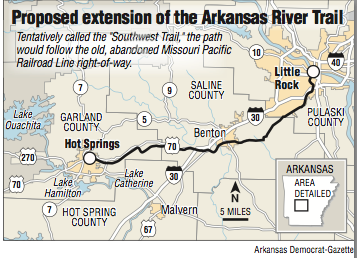Plans to construct a 65-mile hiking and biking trail between Little Rock and Hot Springs cleared a pivotal hurdle this week.
Saline County gave its consent to the proposed Southwest Trail when its Quorum Court unanimously approved a resolution Monday accepting a federal grant that would go toward the first phase of the project -- feasibility studies.
Saline County's approval was the final piece needed after Garland County adopted the same resolution last week, also unanimously, and after Pulaski County approved one in July after fits and starts.
Together, the three counties plan to pull together $520,000 to satisfy a 20 percent local match requirement to receive the $2.6 million federal grant.
The funds will go toward the first phase of the project, which will include an environmental impact study, an engineering study, and a determination of the trail's route. The course is currently expected to run from Little Rock's Central High School, traverse a to-be-restored, century-old wooden bridge across the Saline River, and terminate at Hot Springs National Park.
Pulaski County, which is leading the project, will now seek permission from the Arkansas Department of Transportation to issue a call for bids on the feasibility studies.
Still in its early stages, the project has an element of tenuousness. There's no certainty federal grants will be awarded for the second and third phases of the project, and the quorum courts of all three counties will continue to have to approve funding resolutions as the project progresses.
Already, the project was slowed by opposition within the Pulaski County Quorum Court, whose Republican bloc initially blocked the project in June before Democrats were able to reverse that decision in July.
"I believe that we have much greater needs in our country from an infrastructure perspective, and this is one of many that our federal government would be better served putting our transportation dollars towards those needs -- those bridges, those airports, those roads that need rehabilitation," Justice of the Peace Phil Stowers, R-Maumelle, said in June. "For that reason I can't support the resolution this evening."
And although Saline County Justice of the Peace JR Walters, R-Alexander, voted in favor of the resolution Monday, he gave no commitment to voting the same way on future expenditures.
Walters said he'll "wait and see" how the project plays out and will make his decisions as they come. He stressed the prudence of considering other facets of the project early on, such as how the counties will manage to keep the trail clean and free of trash.
"I'll wait and see. I'm not much of a bicycle rider or jogger. It won't do me any good. I'm 83 years old, I don't do much with bicycles," Walters said.
A majority of county officials, however, see the project not only as an opportunity to expand trail connectivity throughout central Arkansas, but also as an opportunity for economic development.
According to research conducted by the Arkansas Department of Parks and Tourism, expenditures from bicycle-related travel across the state amounted to nearly $250 million in 2016.
A study commissioned in 2015 estimated that the Southwest Trail could have a significant effect on tourism in the three counties, including 65,000 trail users spending $3 million in the region's economy each year and supporting 68 new jobs.
The federal dollars awarded to the project come through the Federal Lands Access Program, which is currently helping fund 400 transportation or recreation projects across the country.
According to a spokesman with the Federal Highway Administration, the federal grant program does not tend to fund a project in one phase but abandon it at a later stage.
"Generally, we work to ensure there are funds for the entire project and not simply pieces of it," spokesman Doug Hecox said in an email.
Pulaski County officials said they will apply for phase two funding in 2018, for land acquisition and design.
Metro on 08/23/2017

